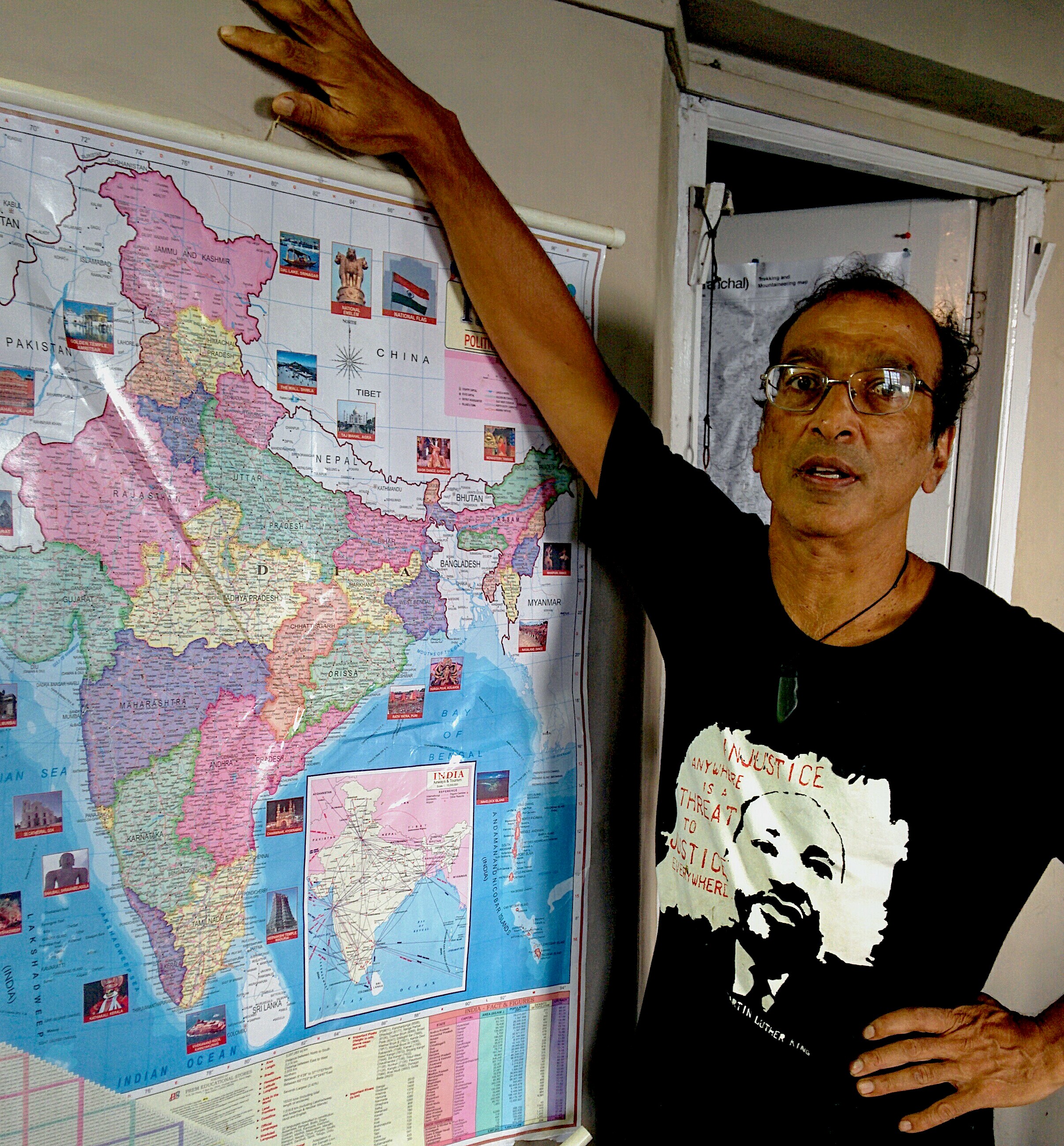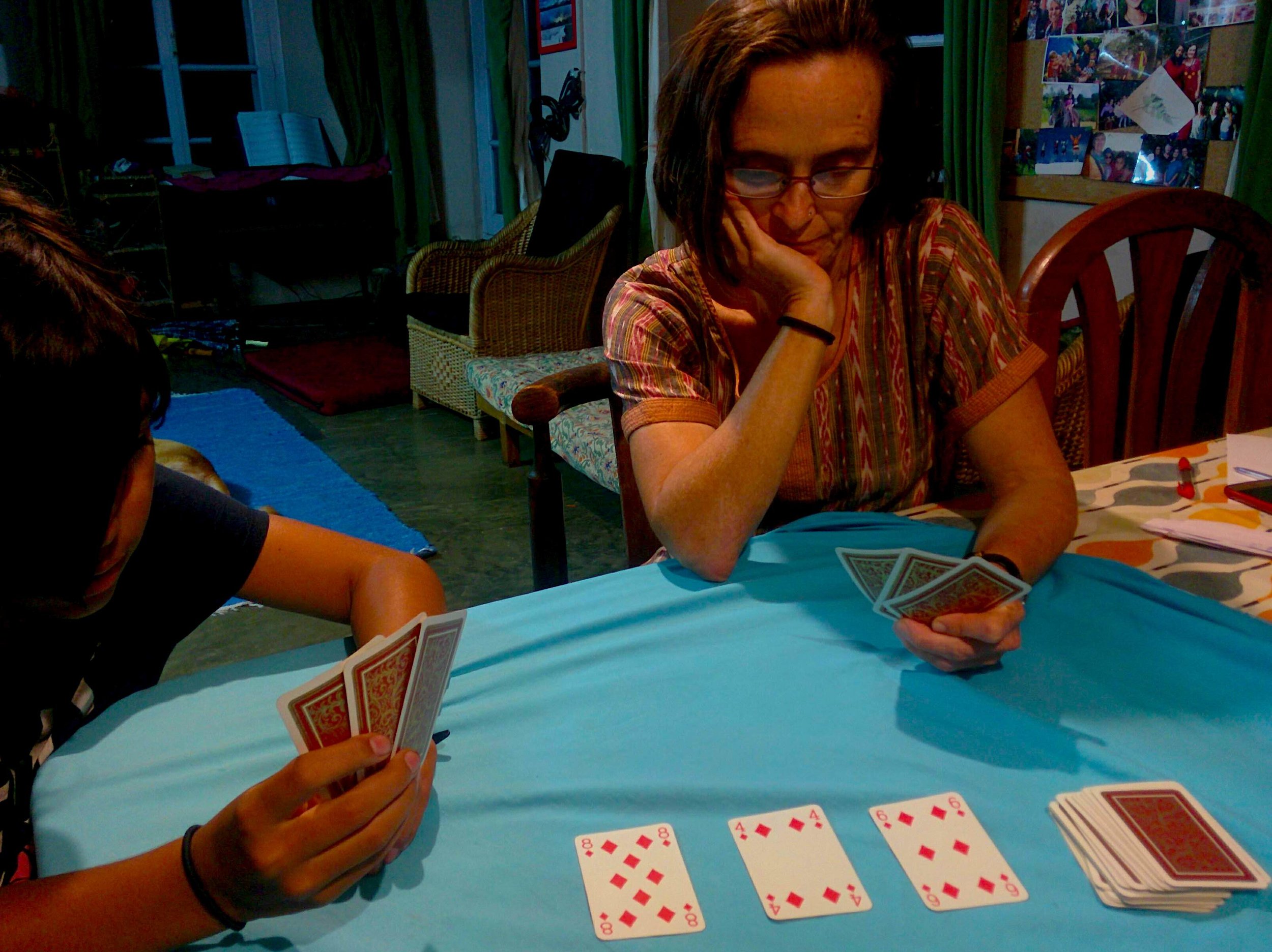Shifting agriculture explained on a dusty floor. Though highly ecologically evolved it has ceded to cashew and rubber monocultures now..
Last year I was Outcome Harvesting' to evaluate an extraordinary project by iBCDE in Cambodia's North-East. Twenty years ago this was virgin jungle where isolated extended families of indigenous people hunted, gathered and lived by shifting agriculture. Then roads! Sauntering down those roads came modernity: deforestation, mining, alcohol, violence, land grabbing, trans-national dams, influx of Khmer people from the plains, edicts from a distant government... cultural annihilation. For people spiritually connected to the forest fences, plantations with one species of tree (rubber or cashew) in rows and the prospect of becoming wage labourers on land that was once freely theirs cuts to the very soul. Somewhat like what Bruce Chatwin's reflection in his beautiful book "The Songlines" did to me, this evaluation, with an organisation deeply immersed in traditional cultures, had me wondering what essential piece of my humanity I have lost in Modernity's unstoppable march,
I love Outcome Harvesting for the depth to which it takes an evaluation. Standard evaluations ask standard questions like "what did the organisation do?" and "what was the result?". Seldom do they ask why or how something happened. Almost never does a standard evaluation ask "And how did you feel when that happened?". Outcome Harvesting collects deep stories and tries to synthesise and extract their combined meaning. Its a rich process, a difficult process, a truly rewarding process. Listen to this story:
We were on the wooden balcony of a village house during the harvest, talking to 6 men ranging from one in his 20's to 60 year olds. I was simply listening. The older men, rheumy eyed, told me what life was like when they were children, hunting and gathering without a care in the world.(we'll discuss in a later post what the child mortality might have been, whether women's rights were respected and if being able to read does or does not make the world bigger....for now just imagine a pristine Eden). One of the young men cut in to say that he had always been aware of illegal loggers felling trees, taking logs away like pieces of his spirit. The older men averred. A 40 year old told me an NGO tried to help. They got a piece of forest gazetted for conservation (only a fragment but better than nothing) and organised a trip to a city for indigenous men to sign a document. They were not clear what they were signing but were assured it was to ensure the forest was always there. Eventually papers were produced which the indigenous men duly thumb-printed. Then to their horror men from the government came, put fences up around the forest and explained that as a reserve indigenous were no longer allowed to hunt or take food. They would be punished if they even took leaves for traditional medicines. "They put barbed wire between us and our spirit" the men lamented.
Waiting to die?
Another added, resigned and forlorn, "But the loggers still go in. They cut our trees anyway."
"Don't you stop them. Can't you report to the officials? I asked.
"They have guns and money" was his complete explanation. "Guns and money" underwrite so much of humanity's development trajectory (read Jared Diamond's brilliant book "Germs, Guns and Steel").
"Without your forest how will your children grow up, how will you eat, you can't work in the plantations. What will you do?" I asked
The oldest man there answered in indigenous language and the others broke into a sad desultory kind of laughter. My translator's english version of their answer to my "What will your do?" is one of the saddest lines I have ever heard:
"Nothing . We are just waiting to die"
Though an indigenous man in forgotten corner of Cambodia is the only one who has expressed it so clearly this was the voice of so many poor and disenfranchised people of our planet, the people failed by the global system of resource distribution, economics and justice commonly known as development. For many people working in the windowless under decks of the single vessel which carries all 7 billion of us along our unfolding trajectory development has failed. "Just waiting to die" expresses their human condition.
From this a new definition of development comes to me. iBCDE in Cambodia did not believe they could stop Modernity's inexorable march. No, their vision statement of about half a page was essentially about "dignified adaptation". They dreamed of a world in which indigenous people could take modernity on their terms, change what they wanted of their culture, retain what they wanted, find a niche in this new world in which to not just exist but to live. Amartya Sen's Nobel prize in economics was significantly for his groundbreaking definition of "Development as Freedom". He postulated development be measured by the freedoms human beings have to live and express themselves. I wonder if there is a Nobel prize in the concept of "Development as life possibility". Could how we have developed be measured by how many people's vision goes from resignedly waiting to die to excitedly exploring living? If societies develop well individuals should get more and richer life possibilities. No-one should just be waiting to die.
Cleared land and dissolute indigenous children on the carcasses of what was once their forest. Here's "the system commonly known as development" viewed from below.
Comments? As always I love to hear your agreement, tweaks to my thinking and especially your violent rabid disagreement.













